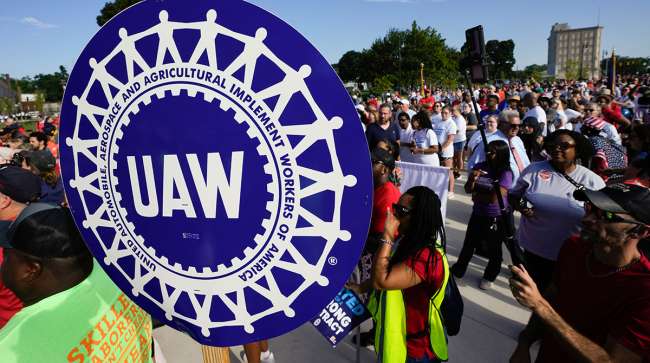UAW Strikes Spread to 38 Locations in 20 States

[Stay on top of transportation news: Get TTNews in your inbox.]
The president of the United Auto Workers said Sept. 22 the union will expand its strike against major automakers by walking out of 38 General Motors and Stellantis plants in 20 states.
Ford was spared additional strikes because the company has met some of the union’s demands during negotiations over the past week, said UAW President Shawn Fain.
The union is pointing to the companies’ huge recent profits as it seeks wage increases of 36% over four years. The companies have offered a little over half that amount. The UAW has other demands, including a 32-hour work week for 40 hours of pay and a restoration of traditional pension plans for newer workers.
The companies say they can’t afford to meet the union’s demands because they need to invest profits in a costly transition from gas-powered cars to electric vehicles.
Auto workers at 38 @UAW @GM and @Stellantis plants are being called on to strike due to the lack of progress at the bargaining table.
"We will shut down parts distribution until those 2 companies come to their senses." pic.twitter.com/mDwWNeTxEL — AFL-CIO ✊ (@AFLCIO) September 22, 2023
The UAW’s contract with the automakers expired at midnight on Sept. 14, and workers walked out of a Ford assembly plant near Detroit, a GM factory in Wentzville, Mo., and a Jeep plant run by Stellantis in Toledo, Ohio. The initial strike has involved about 13,000 of the union’s 146,000 members.
The strike so far involves fewer than 13,000 of the union’s 146,000 members. The companies have laid off a few thousand more, saying some factories are running short on parts because of the strike.
Still, the impact is not yet being felt on car lots around the country — it will probably take a few weeks before the strike causes a significant shortage of new vehicles, according to analysts. Prices could rise even sooner, however, if the prospect of a prolonged strike triggers panic buying.
The union is seeking pay raises of 36% over four years, an end to lower pay scales for new workers, and most boldly, a 32-hour work week for 40 hours of pay. The car companies say they can’t afford the union’s demands despite huge profits because they need to invest in the transformation to electric vehicles.
We have presented a record economic proposal for our #UAW-represented team members, ensuring both their well-being and the future success of @GM. As we strive for a swift and equitable resolution, GM President Mark Reuss addressed several misconceptions about our offer in @freep. https://t.co/pdKegy8x2i — General Motors Manufacturing (@MFG_GM) September 20, 2023
Unifor, which represents Canadian auto workers, chose a more traditional approach: It picked a target company last month, Ford, and announced a tentative agreement this week, just hours before a strike deadline. If the deal is ratified, Unifor expects that GM and Stellantis will agree to similar contracts for Canadian workers.
The Detroit News reported Sept. 21 that a spokesman for Fain wrote on a private group chat on X, formerly Twitter, that union negotiators aimed to inflict “recurring reputations damage and operational chaos” on the carmakers, and “if we can keep them wounded for months they don’t know what to do.”
Ford and GM seized on the messages as a sign of bad faith by the UAW.
“It’s now clear that the UAW leadership has always intended to cause months-long disruption, regardless of the harm it causes to its members and their communities,” GM said in a statement.
Ford spokesman Mark Truby called the messages “disappointing, to say the least, given what is at stake for our employees, the companies and this region.”
The UAW spokesman, Jonah Furman, did not confirm writing the messages, which were linked to the same picture as his X account, and called them “private messages” that “you shouldn’t have,” the newspaper reported.
Want more news? Listen to today's daily briefing below or go here for more info:




